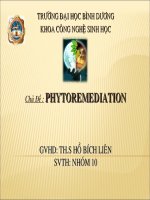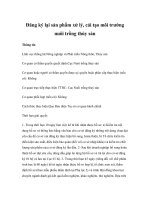thực vật cải tạo môi trường nước
Bạn đang xem bản rút gọn của tài liệu. Xem và tải ngay bản đầy đủ của tài liệu tại đây (237.33 KB, 14 trang )
BỘ GIÁO DỤC VÀ ĐÀO TẠO
TRƯỜNG ĐẠI HỌC NGUYỄN TẤT THÀNH
ĐỀ TÀI:
Thực vật cải tạo môi trường nước
Phytoremendiation
Lớp: 17DTNMT1A
GVHD: Lương Quang Tưởng
Thành viên: Nguyễn Nhật Thịnh
Phạm Thị Kim Trang
Phytoremendiation
Phyto Remendiation
(Thực vật) (Phục hồi)
Was born in 1991.
It is widely used to refer to the technology used to
remove organic pollutants (Plant protection products,
high molecular weight…) and inorganic (Cu, Zn, Pb, Cd…
even radioactive elements) out of the contaminated
enviroment (Land, Groundwater, Wastewater, Sludge…).
The mechanisms of phytoremendiation
Phytovolatilisation
(Bay hơi)
Phytoextraction
(Tách chiết)
Rhizofiltraction
(Lọc)
Phytoremendiation
Rhizophere
Bioremendiation
(Xử lí bằng vùng rễ)
Phytotransformation
(Chuyển dạng)
Phytostabilisation
(Cố định)
Treatment by algae
* Waste water treatment and nutrient recycling
* Turns solar energy into energy in living
organisms
* Destroy the germs
Treatment of wastewater
In large-scale aquatic plants
* It can be detrimental to humans because of
their rapid development and wide distribution
* However, use them to treat waste, make
division compost, food for humans and cattle
Some typical aquatic plants
Species
Floating plant life
Thủy sinh thực vật sống trôi
nổi
Living aquatic Plant
Thủy sinh thực vật sống nổi
Living aquatic Plant
Thủy sinh thực vật sống
chìm
Common name
Science name
Lục bình
Eichhornia crassipes
Bèo tấm
Wolfia arrhiga
Bèo tai tượng
Pistia stratiotes
Cattails
Typha ssp
Bulrush
Scirpus spp
Sậy
Phragmites communis
Hydrilla
Hydrilla verticillata
Water milfoil
Myriophyllum
Spicatum
Blyxa
Blyxa aubertii
Application
Treatment of polluted water in the lake
The task of aquatic plant
In processing systems
Body part
Roots or trunks
Body, leaf in the water or above
the water
Mission
It is a clamshell for bacteria to grow
Filter and absorb solids
Absorb sunlight thus preventing the
growth of algae
Reduces the effect of wind on the
processing surface
Reducing exchange between water and
the atmosphere
Transfer the oxygen from the leaves to
the roots
Advantages
Use sunlight
On-site treatment
Low cost, 10% to 20% compared to conventional
Less secondary waste
No smell
The treated soil can continue to be used
Defect
Limited biomass
Limited to shallow soil, folwing water and
groundwater
Bioaccumulation potential and toxicity of
decomposition products have not been determined
Contaminants are likely to enter the food chain
through herbivorous plants
Contaminants can penetrate deeper into the
groundwater by the roots
Conclude
Plant technology is a new technology
Prospect for cleaning metals in soil
The development of propagation and molecular
biology is essential for this type of technology
The prospect of transgenic plant in cleaning
contaminated areas









